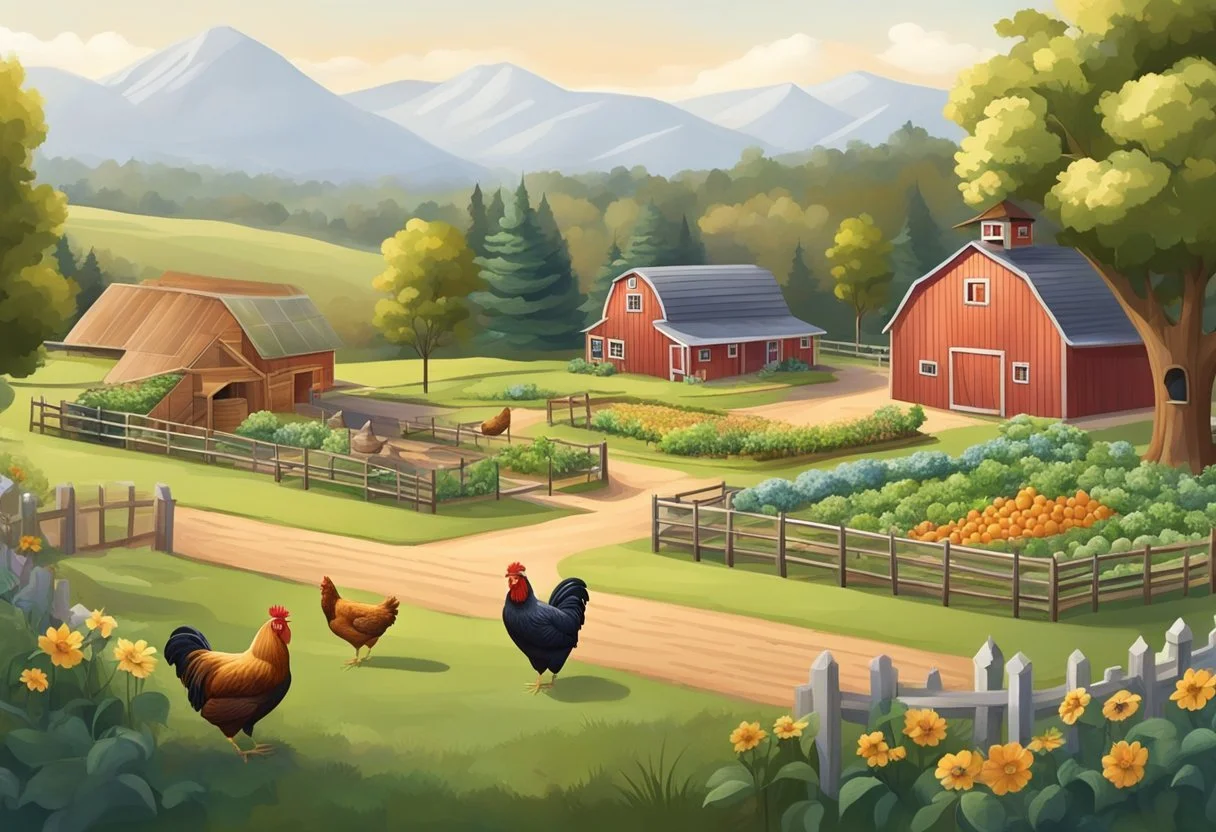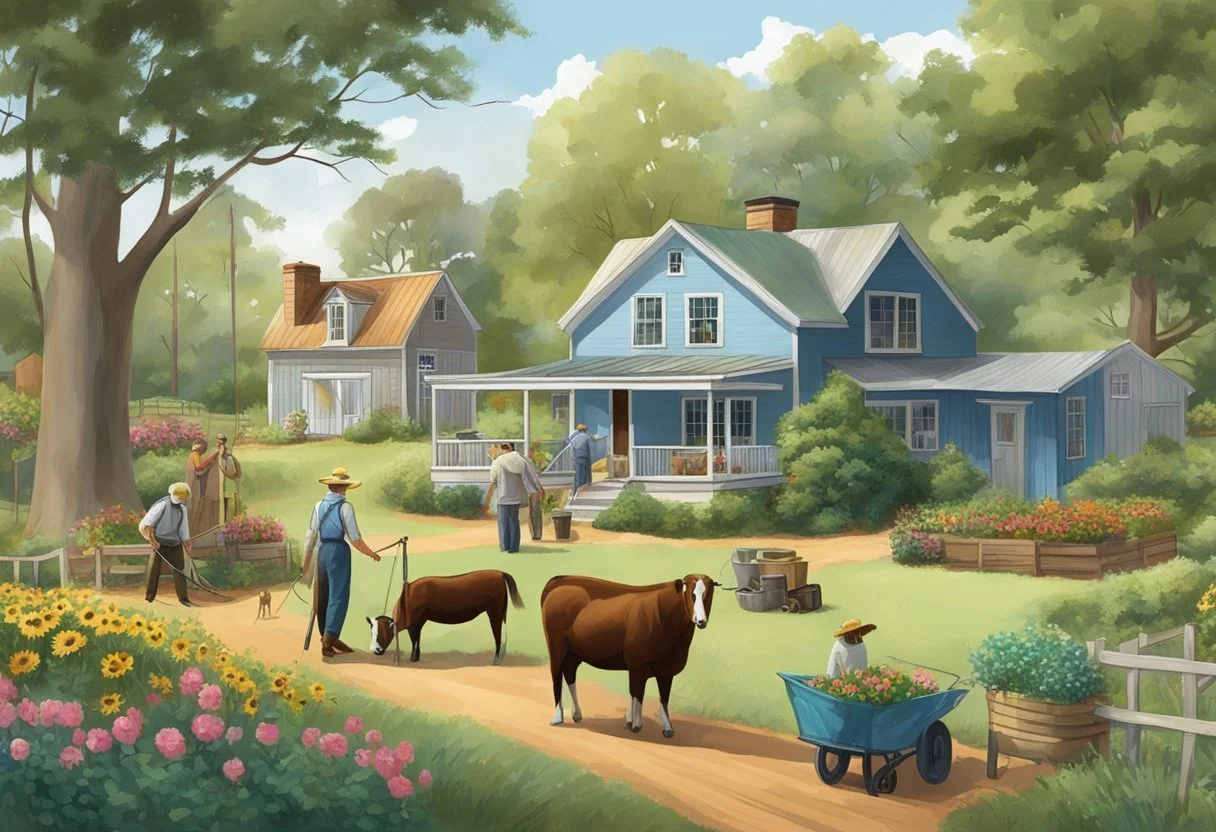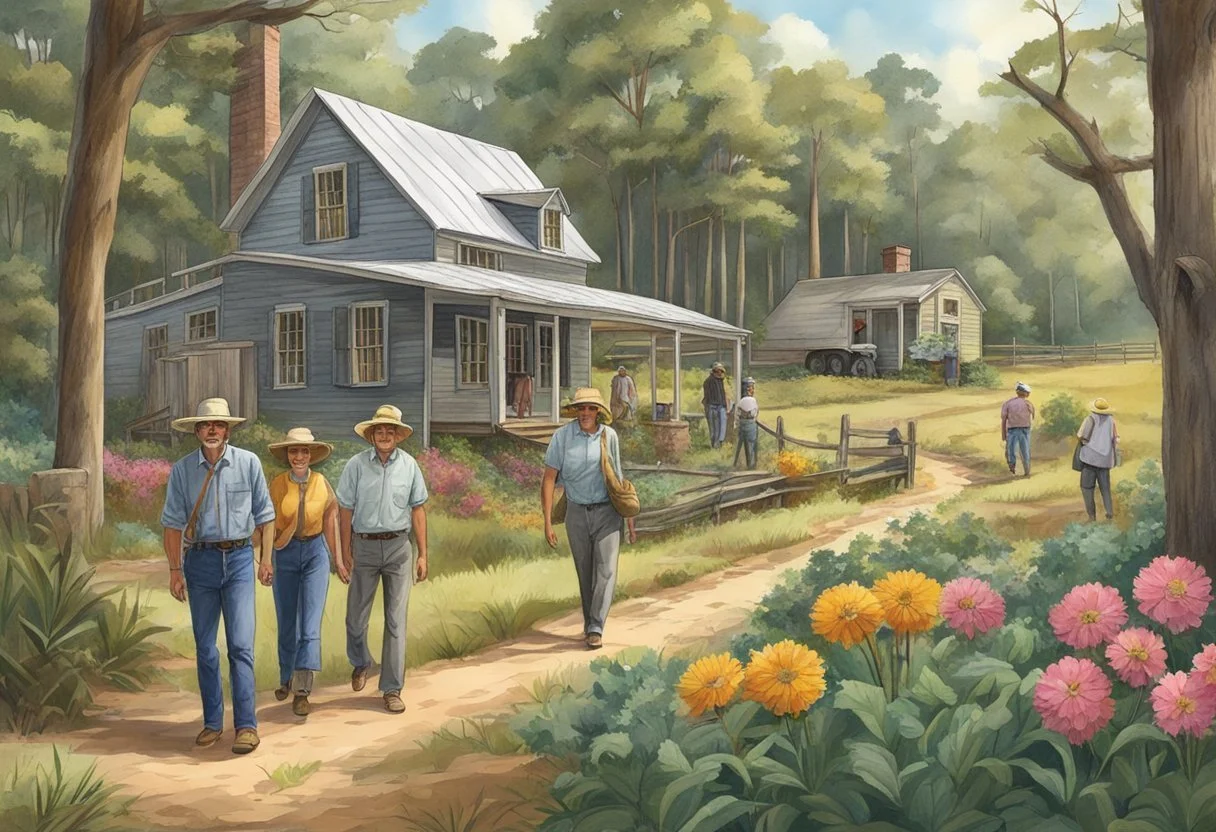Homesteading in South Carolina
Tips for Success
This Article is Part of Our Guide Homesteading State by State
Homesteading in South Carolina offers a unique opportunity for individuals and families to embrace a self-sufficient lifestyle on a small acreage. With its favorable climate, rich soil, and diverse landscape, South Carolina has become an increasingly popular location for those interested in homesteading. This article will explore how small-scale homesteaders can successfully establish their dream homes and gardens in the Palmetto State, while focusing on important factors such as location, sustainability, and community support.
As with any region, South Carolina presents both challenges and advantages for the aspiring homesteader. With an understanding of the local environment and climate, as well as access to resources and support networks, one can create a thriving homestead on a small piece of land. From selecting the right property to learning about sustainable farming practices, there are several key steps to follow for successful homesteading in South Carolina.
In contemplating a move towards homesteading, it is essential to have a clear plan for self-sufficiency and sustainable living. This article will delve into how small acreages can be maximized for food production, animal husbandry, and resource management, ensuring a prosperous and enjoyable homesteading experience in South Carolina.
What is the Homesteading Exemption in South Carolina and is it Related to Farming?
In South Carolina, the homestead exemption is a property tax relief program for homeowners, but it is not directly related to farming.
The key details:
The homestead exemption excludes a portion of the fair market value of an owner-occupied primary residence from property taxes.
To qualify, the owner must occupy the property as their primary residence and meet ownership criteria.
It provides tax relief specifically for eligible owner-occupied primary residences.
Agricultural or undeveloped land may qualify for special assessment as agricultural or agricultural forest land under South Carolina's agricultural use programs if used commercially for farming.
The agricultural use programs have separate eligibility focused on bona fide commercial agricultural operations.
The homestead exemption applies only to qualifying primary residences, separate from agricultural use assessment programs.
In summary, South Carolina's homestead exemption is intended to provide residential property tax relief. Agricultural land could receive preferential assessment under agricultural use programs to support farming. But the homestead exemption itself is not related to agriculture.
Overview of South Carolina for Homesteading
South Carolina, also known as the Palmetto State, is a state located in the southeastern region of the United States along the Atlantic Ocean. With a diverse landscape that includes coastal plains, rivers, and the Piedmont region, it offers a variety of options for those looking to homestead on a small acreage.
The climate in South Carolina is generally warm and humid due to its location along the Atlantic coast. This provides ample opportunity for a wide range of crops to grow throughout most of the year. Some popular crops in the area include:
Corn
Soybeans (how long do soybeans last?)
Peanuts
Sweet potatoes
In addition to crops, the climate in South Carolina supports various types of fruit trees, such as peach, apple, and fig trees, which can contribute to the self-sustainability of a homestead.
Water resources are abundant in South Carolina, thanks to its many rivers, such as the Savannah, Santee, and Pee Dee rivers. These water resources provide not only irrigation for crops but also opportunities for fishing and raising livestock, such as chickens and pigs.
The Piedmont region offers a different landscape compared to the coastal plains. This area is characterized by rolling hills and forested areas, which can be more challenging for farming but also provides opportunities for timber production and hunting.
The cost of land in South Carolina can vary greatly based on the location within the state. Generally, land prices will be higher near urban centers such as Columbia, the state capital, and other popular coastal cities. In contrast, rural areas may offer more affordable options for those looking to purchase land for homesteading.
In terms of laws and regulations, South Carolina is generally considered a friendly state for homesteaders, with fewer restrictions on building codes and agricultural activities compared to other states. However, it’s important to research local zoning laws and regulations before purchasing land to ensure your intended homesteading activities are allowed.
Whether you choose the coastal plains or the Piedmont region, South Carolina offers a diverse environment that can support a successful homestead on a small acreage. With ample water resources, a warm climate, and relatively friendly laws and regulations, the Palmetto State is a great location for aspiring homesteaders.
Understanding Homesteading
Homesteading refers to the practice of developing a self-sufficient lifestyle on a piece of land. In recent years, there has been a resurgence of interest in homesteading, particularly in South Carolina. People are increasingly drawn to the idea of living a more sustainable and environmentally friendly lifestyle. Small homesteads, typically ranging from one to five acres, provide the ideal setting for such a lifestyle.
A primary goal of homesteading is to become self-sufficient. This means that homesteaders strive to meet their basic needs—food, water, and shelter—through their own efforts. By growing their own vegetables, raising animals, and producing their own energy, homesteaders reduce their reliance on external resources.
Establishing a small homestead in South Carolina, or anywhere else for that matter, often involves the following activities:
Gardening: Providing for a significant portion of one's food requirements by growing vegetables, fruits, and herbs.
Animal husbandry: Raising livestock, such as chickens, goats, or rabbits, for meat, eggs, and milk production.
Preserving food: Utilizing methods like canning, drying, and pickling to store excess food for future consumption.
Resource management: Efficiently using natural resources like water, sunlight, and wood for heating and cooking.
Practicing handiwork skills: Building, repairing, and maintaining structures and equipment on the property.
It's important to understand that homesteading is not a one-size-fits-all approach. The specific methods and practices employed on a small homestead will vary depending on factors such as climate, land size, and personal priorities. For example, a homestead in South Carolina might focus more on gardening and fruit tree cultivation due to its temperate climate and fertile soil.
While the concept of homesteading has evolved significantly since the days of the US Homestead Act of 1862, the desire to live a more self-sufficient lifestyle remains. In modern times, homesteading does not necessarily require a remote location or total isolation. Rather, it provides a way to reconnect with nature, reduce one's environmental footprint, and foster a deeper understanding of the resources and skills needed to thrive on a small piece of land.
Land for Purchase in South Carolina
South Carolina offers a variety of land for sale and real estate options to those looking to start a homestead. The state boasts lush farmland and ample acreage for those in search of a rural lifestyle. The following paragraphs will detail some aspects to consider when searching for homesteads for sale and homestead land for sale in the state.
The listing price of land in South Carolina can vary greatly based on factors such as location, size, and available resources. On average, the price per acre ranges from $2,000 to $10,000. However, it is important to research the specific area you are interested in, as local market conditions may impact these numbers.
One area that may be of interest to potential homesteaders is Jasper County. Located in the southern region of the state, Jasper County offers a mix of agricultural and rural living, with plenty of acreage for sale. A quick search of nearby real estate listings reveals that there are numerous properties available in the area, ranging from small plots of land to larger acreages.
When searching for acreage for sale, it is essential to consider factors such as:
Soil quality and fertility
Access to water sources
Proximity to amenities and services
The presence of existing structures or utilities on the property
It's important to inspect the land and consult with local experts to ensure it meets your homesteading needs.
In conclusion, South Carolina offers an array of options for those seeking to establish a homestead on small acreage. Potential buyers need to consider factors such as location, size, and resources when searching for the ideal property. While each individual's preferences and budget may vary, the state's combination of favorable land prices and rural lifestyle makes it an appealing choice for many.
Livestock and Poultry Farming
Livestock farming in South Carolina has the potential to be a profitable venture when focused on small acreage. With the right planning and management practices, you can maximize your space and time to raise healthy animals. The most common types of livestock and poultry raised on small acreages in South Carolina include cattle, swine, and poultry.
Cattle are a popular choice for small-scale farmers in South Carolina. There are various breeds to choose from, with the most popular being the Angus and Hereford. It is important to consider the size of your acreage and your overall goals when selecting a breed. If your main focus is meat production, then beef cattle such as Angus or Hereford are a suitable choice.
Here are a few key points to consider when raising cattle:
Grazing Area: Provide at least 1-2 acres per animal for adequate grazing.
Shelter: Ensure adequate shelter to protect them from harsh weather conditions.
Fencing: Invest in sturdy fencing to keep cattle safe and contained.
Water Source: Provide access to a clean water source at all times.
Swine are another option for small acreage farming in South Carolina. They are relatively easier to manage than cattle and can provide a good source of meat. However, it is essential to maintain proper sanitary conditions and waste management systems to avoid odor issues and maintain overall health.
Here are some key aspects to consider when raising swine:
Space Requirements: Provide 50-100 sq ft per animal.
Feed: Swine require a high-quality, balanced diet containing grain, protein, and minerals.
Shelter: Construct a sturdy enclosure with proper ventilation and protection from the elements.
Waste Management: Develop a waste management plan to maintain cleanliness and prevent odors.
Poultry farming is another common livestock option for small acreage farming in South Carolina. Chickens, ducks, and turkeys can be raised for both meat and egg production. Raising poultry offers several advantages, such as a lower start-up cost, smaller space requirements, and faster return on investment compared to other livestock types.
Important factors to consider when raising poultry include:
Housing: Provide a secure, well-ventilated, and easy-to-clean coop or enclosure.
Nutrition: Ensure a balanced diet for optimal growth and egg production, with access to clean water at all times.
Health: Regularly monitor your flock's health and practice biosecurity measures to prevent the spread of disease.
In conclusion, livestock and poultry farming on small acreage in South Carolina can be a profitable venture with the right planning and management. Whether you choose to raise cattle, swine, or poultry, carefully consider your resources and goals to make the best decision for your farm.
Crop Farming on Small Acreage
Rice (how long does rice last?): South Carolina has a rich history of rice farming, dating back to the late 1600s. Small acreage homesteads can cultivate rice, given its adaptability to varying plot sizes. Carolina Gold is a traditional variety that thrives in the region's climate. Rice requires abundant water, so implementing irrigation systems or locating your rice field near a water source is essential.
Tobacco: Tobacco is another historically significant crop in South Carolina. Small-scale homesteaders can grow tobacco for personal use or sale, adhering to federal and state regulations. Tobacco plants require full sunlight, and maintaining proper spacing is crucial to ensure sufficient airflow as they grow.
Crops to consider for rotation on small acreage include:
Rice
Tobacco
Soybeans
Hay
Soybeans: Soybeans are a versatile crop and serve as an excellent rotation choice for maintaining soil health. They are high in protein and can be used as an income generator for small farms or as a food source for livestock. Soybeans require well-drained soil with a pH level between 6.0 and 6.5. In South Carolina, the planting season for soybeans generally falls between late April and early June.
Hay: Producing hay on small acreage can serve multiple purposes. Not only can it be a valuable food source for livestock, but selling surplus hay can also provide an additional income stream. To optimize hay production, consider planting pasture grasses such as Bermuda grass, fescue, or ryegrass. Regular cutting and maintaining proper field management practices is vital for successful hay production.
In conclusion, cultivating crops on small acreage is achievable with proper planning, water sources, and field management. By selecting suitable crops like rice, tobacco, soybeans, and hay, homesteaders in South Carolina can create a sustainable and successful agricultural environment.
Water Access and Sources
One of the essential aspects of homesteading is ensuring a reliable water source for household use, irrigation, and livestock. In South Carolina, homesteaders have various options to choose from, including lakes and wells.
Lakes: South Carolina is home to several freshwater lakes that can serve as water sources for small acreage homesteaders. Some notable nearby lakes are Lake Murray, Lake Marion, and Lake Moultrie. It is crucial to research the water quality of potential lake sources, as some may be prone to pollution or unsuitable for consumption. Additionally, it is vital to comply with state and local laws when utilizing water from public lakes.
Wells: Drilling a well is a common solution to establishing a reliable water source. South Carolina has specific regulations governing well construction, and homesteaders need to follow these rules. It is recommended to consult with a licensed professional to determine the best location, design, and depth for your well.
Homesteaders should consider the following when choosing a water source:
Water quality: Ensure water is suitable for consumption and agriculture use.
Distance: When considering a lake, assess the distance between the lake and your homestead to determine if it is practical.
Legal requirements: Comply with state and local laws when utilizing public lakes and constructing wells.
Installation and maintenance: Be prepared for associated costs of drilling, pump installation, and regular well maintenance.
In conclusion, South Carolina homesteaders should carefully assess their options to establish a reliable and sustainable water source. Whether it's a nearby lake or a private well, considering factors such as water quality, distance, and legal requirements will ensure a successful homestead journey.
Recreation Activities
South Carolina's rich natural resources offer various recreational activities for homesteaders on small acreages. The picturesque landscape presents outdoor enthusiasts with a range of options to enjoy their leisure time. Some popular recreational activities include hunting, wildlife watching, hiking, and fishing.
Hunting is an integral part of South Carolina's outdoor heritage, and homesteaders can take advantage of the state's abundant game species. One of the most sought-after game animals in the area is the turkey. South Carolina boasts a healthy population of Eastern Wild Turkeys, providing ample opportunities for hunters pursuing these birds. Homesteaders can partake in turkey hunting on their own property or explore nearby public hunting land, such as state-managed wildlife management areas (WMAs).
In addition to turkey hunting, other popular game animals include white-tailed deer, quail (What wine goes well with quail?), and waterfowl. Hunters must, however, obtain the appropriate hunting licenses and follow state hunting regulations. For detailed information on hunting seasons, bag limits, and hunter safety, the South Carolina Department of Natural Resources (SCDNR) is an excellent resource.
Wildlife watching is another popular recreational activity for homesteaders. Observing the various bird species, mammals, and other wildlife native to South Carolina can be both educational and entertaining. With a pair of binoculars and a field guide, homesteaders can often witness a wide variety of animals from the comfort of their own property.
South Carolina's natural beauty and diverse topography also provide fantastic opportunities for hiking and exploring the landscape around small acreages. Shaded forests, rolling hills, and pristine wetlands offer scenic routes for hiking, and homesteaders can often find excellent spots for picnics or wildlife photography. Moreover, kayaking or canoeing through picturesque waterways is another great way to explore the state's diverse ecosystems.
Finally, South Carolina boasts a wealth of freshwater and saltwater fish species. Anglers can enjoy some quality fishing on their property if they have stream or pond access. Fishing licenses and regulations apply, and guidelines can be found through the SCDNR.
In summary, homesteaders in South Carolina with small acreages have numerous recreational activities to choose from, whether they want to engage in hunting, turkey spotting, or simply enjoying the great outdoors.
Role of Tourism in Homesteading
Tourism can greatly impact homesteading in South Carolina, especially when considering locations near popular tourist destinations like Charleston. Homesteaders can take advantage of the influx of visitors to the area to create additional income streams, which not only contributes to their sustainability, but also creates a mutually beneficial relationship for both the homesteaders and the local tourism industry.
One way that homesteaders can benefit from the thriving tourism in the United States, specifically in South Carolina, is by offering farm stays or partnering with nearby accommodations. Visitors are often drawn to the idea of experiencing a simpler, rural lifestyle by staying on a working homestead. Here, they can enjoy activities like:
Gardening and harvesting
Animal care or feeding
Cooking classes using farm-fresh ingredients
Nature walks or hiking
Aside from farm stays, homesteaders can also capitalize on creating unique agricultural experiences for tourists. They can offer workshops or classes to impart their knowledge on different aspects of homesteading, such as:
Organic gardening methods
Beekeeping
Foraging for wild foods
Food preservation skills
Furthermore, by focusing on niche experiences, homesteaders can appeal to specific groups of tourists interested in food, agriculture, or sustainable living. This can include farm-to-table cooking classes, eco-tourism, and nature-based retreats.
On the other hand, involving tourism in homesteading also promotes local cuisine and farmers' markets. This symbiotic relationship helps tourists get a taste of authentic South Carolina food while providing an avenue for homesteaders to sell their produce and handcrafted goods directly to consumers.
In summary, tourism presents an excellent opportunity for homesteaders in South Carolina to combine their passion for sustainable living with a source of supplemental income. Not only does this benefit the homesteaders, but it also contributes to the local tourism industry by providing unique experiences for visitors.





